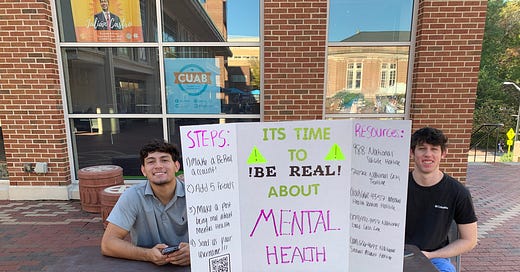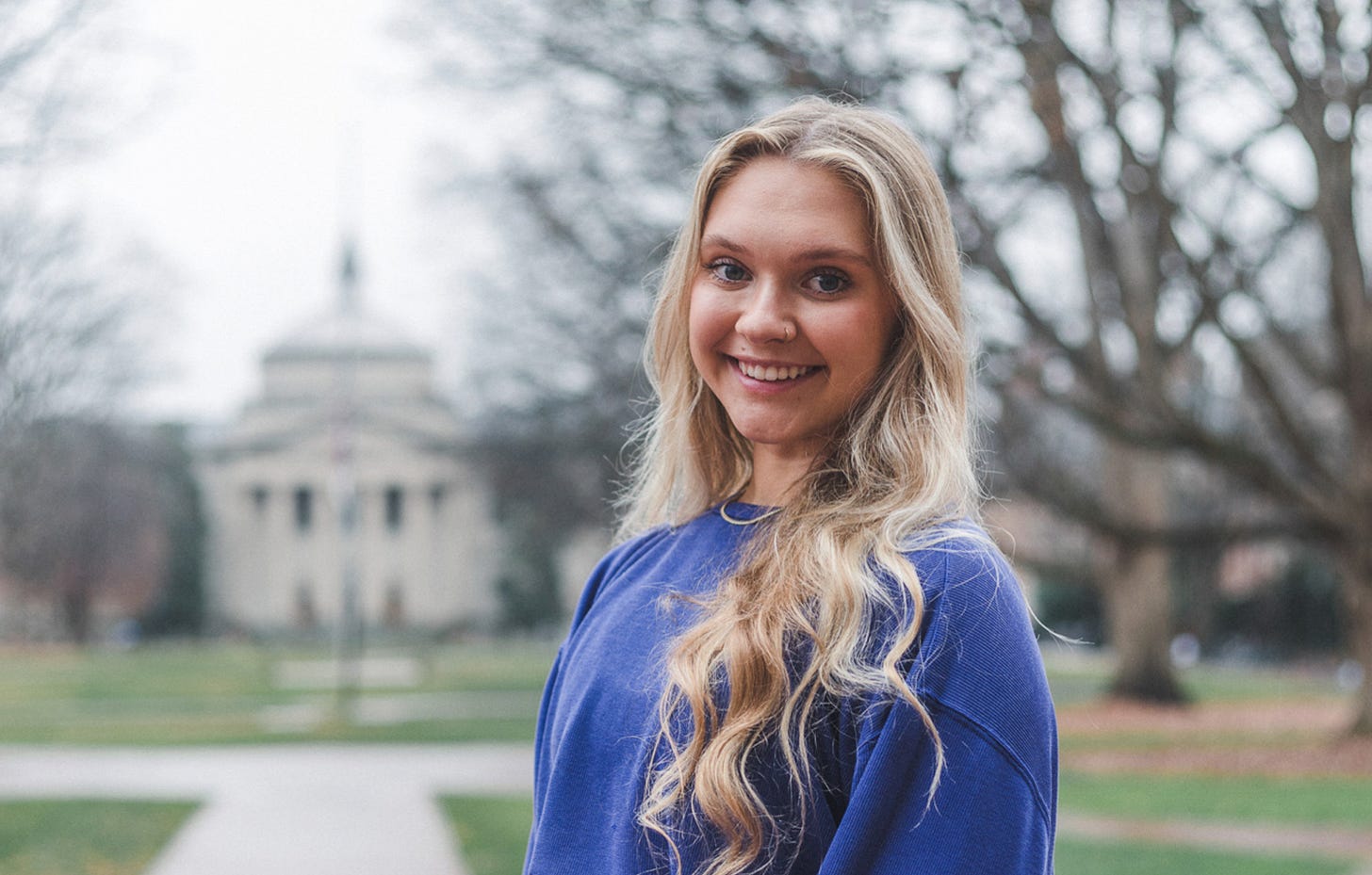Colleges focus on mental health as students return
Young adults are more likely to suffer from anxiety and depression compared with other age groups, studies show
You’re reading The Charlotte Ledger, a digital publication with original local news and insights for Charlotte, N.C.
Today, we are continuing with a series of articles in partnership with North Carolina Health News about North Carolina’s teen mental health crisis. Find out more about the series here.
After strings of suicides and a prominent shooting, universities zero in on mental health on campus; stepped-up counseling, wellness days, therapy dogs
Christopher Salazar (left) and Asher Cohn are helping lead “Walk. Support. Glow.” — a group at UNC Chapel Hill that helps raise awareness about mental health resources. (Photo courtesy of Peyton Morris)
By Jennifer Fernandez
Co-published with North Carolina Health News
After UNC Chapel Hill lost several students to suicide over a six-week period in 2021, Peyton Morris was inspired to do something.
Morris, who lost her father to suicide when she was 16, restarted a student organization called “Walk. Support. Glow.” that works to bring more awareness about mental health issues and the resources available to students.
“Once I lost my dad, it just really opened my eyes that mental illness can affect anybody and everybody,” said Morris, a 20-year-old junior from Currituck, in northeastern North Carolina.
As students return to their dorms and to full class loads this fall, North Carolina universities are continuing efforts to address mental health concerns on campus. Along with student efforts like Morris’, colleges are offering everything from therapy dogs and meditation spaces to peer counseling, happiness classes and yoga.
Unfortunately, both UNC Chapel Hill and N.C. State started the new academic year with deaths on campus.
N.C. State students returned over the Labor Day weekend to learn that a student was found dead Monday outside of a dorm on campus. Officials have not released a cause of death. Last academic year, seven N.C. State students died by suicide, prompting the school to launch a task force to examine how it could better support struggling students.
At UNC Chapel Hill, the fatal shooting of a faculty member on campus the first day of classes last week just added to the mental health load for students there. Faculty are calling for a mental health task force to be formed.
“Mental health is more important than ever here on campus,” Morris said Friday in an email.
After the 2021-2022 suicides, UNC Chapel Hill responded by giving students time off with “wellness days,” bringing therapy dogs to campus and making other efforts to support students emotionally.
Peyton Morris, a 20-year-old UNC Chapel Hill junior from northeastern North Carolina, started a student group that helps inform students about mental health resources. The death of her father by suicide “really opened my eyes that mental illness can affect anybody and everybody,” she says.
A rising concern
Mental health concerns among youth were rising before Covid. Then, the pandemic exacerbated issues for those who had been struggling with socialization skills and for those who lost out on key time learning how to connect with peers due to the isolating effects of lockdowns and masking, college health officials said.
The latest Youth Risk Behavior Survey, which reflects 2021 data, shows that mental health remains an ongoing issue among high school students, which means colleges and universities will also continue to grapple with these issues in the coming years.
The web-based Healthy Minds Study, which surveyed hundreds of college students nationwide in 2021-22, showed that 44% reported experiencing depression and 37% said they experienced anxiety.
Some 15% of students said they thought about suicide, 6% said they made a plan and 2% attempted to end their lives.
Though the Covid pandemic exacerbated mental health concerns among students, it is not the only factor, according to education and health officials.
The National Alliance on Mental Illness warns that social media can stymie social skills in young people by limiting in-person interactions where people learn about others through their facial expressions, tone of voice and reactions. Social media can also expose youth to bullying and idealized depictions of life that can create stress.
College students face unique challenges, said Eleanor Lott, a 20-year-old N.C. State student from Clemmons, a suburb of Winston-Salem.
“People need to understand that college mental health and adult mental health, or young adult mental health, are still two different things,” she said. “I think a lot of people don't realize how unique the struggles of a college student are — even outside of having to learn so much at once.”
Lott, who served on N.C. State’s task force on student mental health during the 2022-23 school year, said there’s a feeling of exasperation among students.
“They're tired of seeing their peers suffering,” she said.
In the wake of last year’s suicides, wellness events at N.C. State now run the gamut from playing with therapy dogs to planting trees.
N.C. State has started putting into practice some of the mental health task force’s recommendations, such as adding wellness days on the calendar and expanding the clinical services team at the Counseling Center, according to Mick Kulikowski, the university’s director of strategic communications and media relations. The university is also continuing its partnership with AcademicLiveCare to provide teletherapy services at no additional cost and no limit on visits.
Residual pandemic stressors, more awareness
Half of adults aged 18-24 reported anxiety and depression symptoms this year compared with a third of adults overall, according to an analysis of the U.S. Census Bureau’s Household Pulse Survey by the nonprofit KFF, which focuses on health policy issues.
The data also show that young adults are more likely than adults of any other age group to experience mental health symptoms, KFF reported in March.
“Many young adults have come of age in an era of pandemic-related school closures, remote work and job and income loss, all of which may contribute to poor mental health,” the nonprofit wrote. “Additionally, young adults in college settings may encounter increased difficulty accessing treatment.”
At UNC Charlotte, about 40% of students are the first in their families to go to college, said Erica Lennon, director of the university’s Counseling and Psychological Services. They can struggle with navigating the nuances of being on a college campus because they don’t have family members who can share experiences with them, she said.
UNC Charlotte is looking to offer restorative yoga, which can address the tension and other manifestations of trauma in the body.
Lennon said that when she first arrived about 14 years ago, the counseling center at UNC Charlotte had to do a lot of outreach to let students know services were available. In recent years, even before the pandemic, more students started coming there for help.
“I do think that we are not only more aware, but I think the conversations are happening more frequently,” she said.
Morris, the UNC Chapel Hill student, said younger generations seem to be more willing to seek help but she worries that a lot still gets “swept under the rug.”
“But the more people speak about it … the better things are gonna get,” she said. “Because if you keep putting the stigma around mental illness and suicide … it’s never gonna get better.”
Jennifer Fernandez is a freelance writer and editor based in Greensboro who has won awards in Ohio and North Carolina for her writing on education issues. She has spent more than a decade as an editor, including as managing editor of the News & Record in Greensboro. A fuller version of this article was published by North Carolina Health News.
This article is part of a partnership between The Ledger and North Carolina Health News to produce original health care reporting focused on the Charlotte area. We make these articles available free to all. For more information, or to support this effort with a tax-free gift, click here.
➡️ Have a teen who is severely depressed, anxious or experiencing another mental health condition? See our list of youth mental health resources for kids in crisis.
‘The Kids Are Not Alright’ series on teen mental health, from The Charlotte Ledger and N.C. Health News
WEDNESDAY: North Carolina emergency rooms are being overwhelmed by adolescents in crisis
TODAY: Colleges are focusing on mental health as students return
COMING FRIDAY: Mental health providers are launching programs to help fill the gaps in care — and hoping for help from the county and state
In brief:
CMS test scores: Approximately 52.1% of Charlotte-Mecklenburg Schools students scored proficient on state-level exams last year — an improvement over last year — and more than one-third of schools exceeded growth targets. But the numbers are still below pre-pandemic figures and this year’s state average, and 59 CMS schools earned the state’s low-performing designation, which is an increase of 9 schools from the previous year. (Observer)
Raises for city manager, clerk, attorney: The Charlotte City Council voted last week to give City Manager Marcus Jones a 4% raise. He now makes $451,933 in base pay, with total compensation of $521,662, WSOC’s Joe Bruno reported on Twitter. The council also voted for a 6% raise to the city clerk and a 3.5% raise to the city attorney, Mayor Vi Lyles said at the meeting.
ABC bill moves forward: A bill that would allow ABC stores to open on Sundays as well as the Fourth of July, Labor Day and New Year’s Day passed a committee in the N.C. House. The measure would also allow bars and restaurants to sell to-go cocktails. (WUNC)
New retailers headed to Ballantyne: Developer Northwood Office announced three new tenants at its Ballantyne Reimagined development: Bossy Beulah's Chicken Shack from Charlotte chef Jim Noble, haircut place Arrow—Cuts & Shaves and strength-training workout spot Solidcore. Most will open in 2024 and join a lineup including Olde Mecklenburg Brewery and Rooster’s Wood-Fired Kitchen.
🇺🇸 Need to study for Tuesday’s Charlotte Democratic primary election? Check out The Ledger’s Election Hub, with candidate videos and links a-plenty to other voter guides, news articles and endorsements. Cast an informed vote!
Need to sign up for this e-newsletter? We offer a free version, as well as paid memberships for full access to all 4 of our local newsletters:
➡️ Opt in or out of different newsletters on your “My Account” page.
➡️ Learn more about The Charlotte Ledger
The Charlotte Ledger is a locally owned media company that delivers smart and essential news through e-newsletters and on a website. We strive for fairness and accuracy and will correct all known errors. The content reflects the independent editorial judgment of The Charlotte Ledger. Any advertising, paid marketing, or sponsored content will be clearly labeled.
Like what we are doing? Feel free to forward this along and to tell a friend.
Social media: On Facebook, Instagram, Twitter and LinkedIn.
Sponsorship information/customer service: email support@cltledger.com.
Executive editor: Tony Mecia; Managing editor: Cristina Bolling; Staff writer: Lindsey Banks; Business manager: Brie Chrisman, BC Creative





